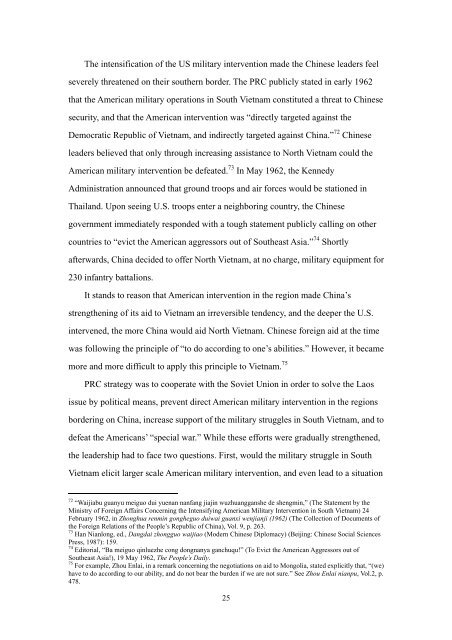1962: The Eve of the Left Turn in China's Foreign Policy - Claude Arpi
1962: The Eve of the Left Turn in China's Foreign Policy - Claude Arpi
1962: The Eve of the Left Turn in China's Foreign Policy - Claude Arpi
You also want an ePaper? Increase the reach of your titles
YUMPU automatically turns print PDFs into web optimized ePapers that Google loves.
<strong>The</strong> <strong>in</strong>tensification <strong>of</strong> <strong>the</strong> US military <strong>in</strong>tervention made <strong>the</strong> Ch<strong>in</strong>ese leaders feelseverely threatened on <strong>the</strong>ir sou<strong>the</strong>rn border. <strong>The</strong> PRC publicly stated <strong>in</strong> early <strong>1962</strong>that <strong>the</strong> American military operations <strong>in</strong> South Vietnam constituted a threat to Ch<strong>in</strong>esesecurity, and that <strong>the</strong> American <strong>in</strong>tervention was “directly targeted aga<strong>in</strong>st <strong>the</strong>Democratic Republic <strong>of</strong> Vietnam, and <strong>in</strong>directly targeted aga<strong>in</strong>st Ch<strong>in</strong>a.” 72 Ch<strong>in</strong>eseleaders believed that only through <strong>in</strong>creas<strong>in</strong>g assistance to North Vietnam could <strong>the</strong>American military <strong>in</strong>tervention be defeated. 73 In May <strong>1962</strong>, <strong>the</strong> KennedyAdm<strong>in</strong>istration announced that ground troops and air forces would be stationed <strong>in</strong>Thailand. Upon see<strong>in</strong>g U.S. troops enter a neighbor<strong>in</strong>g country, <strong>the</strong> Ch<strong>in</strong>esegovernment immediately responded with a tough statement publicly call<strong>in</strong>g on o<strong>the</strong>rcountries to “evict <strong>the</strong> American aggressors out <strong>of</strong> Sou<strong>the</strong>ast Asia.” 74 Shortlyafterwards, Ch<strong>in</strong>a decided to <strong>of</strong>fer North Vietnam, at no charge, military equipment for230 <strong>in</strong>fantry battalions.It stands to reason that American <strong>in</strong>tervention <strong>in</strong> <strong>the</strong> region made Ch<strong>in</strong>a’sstreng<strong>the</strong>n<strong>in</strong>g <strong>of</strong> its aid to Vietnam an irreversible tendency, and <strong>the</strong> deeper <strong>the</strong> U.S.<strong>in</strong>tervened, <strong>the</strong> more Ch<strong>in</strong>a would aid North Vietnam. Ch<strong>in</strong>ese foreign aid at <strong>the</strong> timewas follow<strong>in</strong>g <strong>the</strong> pr<strong>in</strong>ciple <strong>of</strong> “to do accord<strong>in</strong>g to one’s abilities.” However, it becamemore and more difficult to apply this pr<strong>in</strong>ciple to Vietnam. 75PRC strategy was to cooperate with <strong>the</strong> Soviet Union <strong>in</strong> order to solve <strong>the</strong> Laosissue by political means, prevent direct American military <strong>in</strong>tervention <strong>in</strong> <strong>the</strong> regionsborder<strong>in</strong>g on Ch<strong>in</strong>a, <strong>in</strong>crease support <strong>of</strong> <strong>the</strong> military struggles <strong>in</strong> South Vietnam, and todefeat <strong>the</strong> Americans’ “special war.” While <strong>the</strong>se efforts were gradually streng<strong>the</strong>ned,<strong>the</strong> leadership had to face two questions. First, would <strong>the</strong> military struggle <strong>in</strong> SouthVietnam elicit larger scale American military <strong>in</strong>tervention, and even lead to a situation72 “Waijiabu guanyu meiguo dui yuenan nanfang jiaj<strong>in</strong> wuzhuangganshe de shengm<strong>in</strong>,” (<strong>The</strong> Statement by <strong>the</strong>M<strong>in</strong>istry <strong>of</strong> <strong>Foreign</strong> Affairs Concern<strong>in</strong>g <strong>the</strong> Intensify<strong>in</strong>g American Military Intervention <strong>in</strong> South Vietnam) 24February <strong>1962</strong>, <strong>in</strong> Zhonghua renm<strong>in</strong> gongheguo duiwai guanxi wenjianji (<strong>1962</strong>) (<strong>The</strong> Collection <strong>of</strong> Documents <strong>of</strong><strong>the</strong> <strong>Foreign</strong> Relations <strong>of</strong> <strong>the</strong> People’s Republic <strong>of</strong> Ch<strong>in</strong>a), Vol. 9, p. 263.73 Han Nianlong, ed., Dangdai zhongguo waijiao (Modern Ch<strong>in</strong>ese Diplomacy) (Beij<strong>in</strong>g: Ch<strong>in</strong>ese Social SciencesPress, 1987): 159.74 Editorial, “Ba meiguo q<strong>in</strong>luezhe cong dongnanya ganchuqu!” (To Evict <strong>the</strong> American Aggressors out <strong>of</strong>Sou<strong>the</strong>ast Asia!), 19 May <strong>1962</strong>, <strong>The</strong> People’s Daily.75 For example, Zhou Enlai, <strong>in</strong> a remark concern<strong>in</strong>g <strong>the</strong> negotiations on aid to Mongolia, stated explicitly that, “(we)have to do accord<strong>in</strong>g to our ability, and do not bear <strong>the</strong> burden if we are not sure.” See Zhou Enlai nianpu, Vol.2, p.478.25

















